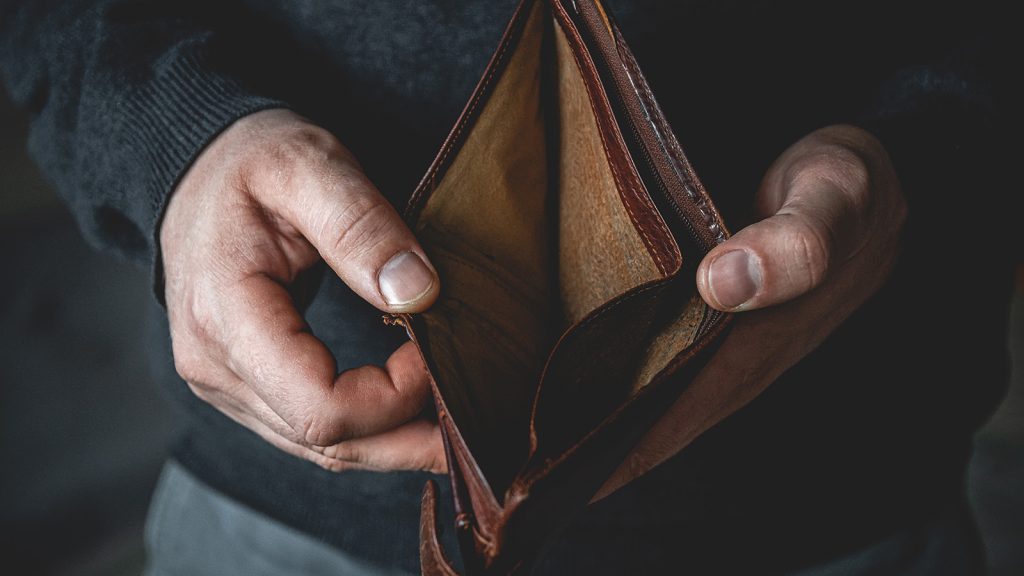Are you “poor”? Believe it or not, that’s a more difficult question than it might appear.
The word “poor” carries a big weight. It’s a label often associated with shame and stigma, making it difficult to confront, even when facing financial hardship. But understanding poverty, both as a concept and a lived experience, is crucial for addressing it effectively.
It’s estimated that nearly 38 million people live below the poverty level in the United States, which is a huge number. That’s 11.5% of U.S. residents. The poorest states include Mississippi, Louisiana, New Mexico and West Virginia.
Let’s shed light on how poverty is defined, the factors that contribute to it, and most importantly, what steps you can take if you’re struggling financially.
Before we continue: If you feel like you’re not as financially successful as you should be, join the Millionaire Habits newsletter (free) and learn the habits wealthy people use to get (and stay) rich. Believe it or not, these habits can be adopted by anyone, regardless of income.
Defining Poverty: More Than Just a Number
Poverty isn’t a one-size-fits-all concept. Being in poverty is about more than just a low income or having a lot of debt. It’s a complex issue that encompasses a lack of resources and opportunities in various aspects of life.
Here’s a breakdown:
Financial:
- Low Income: This is the most common understanding of poverty – not having enough money to meet basic needs like food, shelter, clothing, and healthcare.
- Limited Assets: Poverty often involves a lack of savings, property, or other assets that could provide financial security or be used in emergencies.
- Debt Cycles: People in poverty can get trapped in cycles of debt due to high-interest loans or unexpected expenses, making it even harder to escape poverty.
Beyond Finances:
- Limited Access to Education and Healthcare: Poverty can limit access to quality education and healthcare, leading to fewer opportunities for advancement and poorer health outcomes.
- Food Insecurity: Not having consistent access to enough affordable, nutritious food is a significant aspect of poverty.
- Housing Instability: Poverty can mean living in unsafe or inadequate housing, experiencing frequent moves, or even homelessness.
- Social Exclusion: Poverty can lead to social isolation, discrimination, and reduced participation in society.
It’s important to remember:
- Poverty is Relative: What constitutes poverty can vary depending on the location and societal context.
- Poverty is Experienced Differently: Individuals and families experience poverty in unique ways, and there’s no single narrative.
- Poverty is Not a Personal Failing: It’s often the result of systemic issues and barriers.
In the United States, the Federal Poverty Level (FPL) is used to determine eligibility for various assistance programs. However, the FPL is often criticized for not accurately reflecting the true cost of living in many areas.
The Causes and Consequences of Poverty
Poverty is rarely caused by a single factor. It’s often the result of a complex interplay of systemic issues and individual circumstances.
- Systemic factors like limited access to quality education, healthcare disparities, and discriminatory practices create barriers to economic opportunity.
- Individual circumstances such as job loss, illness, low wages, or family breakdown can push individuals and families into financial hardship.
The consequences of poverty extend far beyond financial strain. It can impact physical and mental health, limit educational attainment, increase the risk of homelessness, and perpetuate cycles of poverty across generations.
Take Action: Resources and Support for Those in Need
If you’re struggling financially, remember that you’re not alone, and there is help available. Numerous resources and support systems exist to help individuals and families overcome financial hardship.
1. Financial Assistance:
- Government Programs: Explore government assistance programs like SNAP (food stamps), TANF (Temporary Assistance for Needy Families), and SSI (Supplemental Security Income). These programs provide crucial support for food, housing, and basic needs.
- Non-Profit Organizations: Contact local food banks, charities, and community organizations that offer financial aid, food assistance, and other forms of support.
2. Education and Job Training:
- Community Colleges: Consider enrolling in a community college to gain affordable education or vocational training. These institutions offer pathways to higher-paying careers and increased earning potential.
- Workforce Development Programs: Take a look at workforce development programs that provide job search assistance, skills training, and career counseling.
3. Healthcare Access:
- Medicaid: If you meet the eligibility requirements, apply for Medicaid, a government health insurance program for low-income individuals and families.
- Community Health Centers: Utilize community health centers that offer affordable healthcare services, including primary care, dental care, and mental health services.
4. Housing Support:
- Section 8 Housing: Apply for Section 8 housing vouchers, which provide government subsidies to help low-income families afford safe and decent housing.
- Homeless Shelters: If you’re facing homelessness or housing instability, seek assistance from local homeless shelters that offer temporary accommodation, meals, and support services.
A Path Towards a Brighter Future
Escaping poverty requires a multi-faceted approach that addresses both the symptoms and root causes of financial hardship.
Understanding the complexities of poverty and accessing available resources can help individuals and families begin to build a more secure and hopeful future. Remember, seeking help is a sign of strength, and there are people and organizations ready to support you on your journey towards financial stability.



